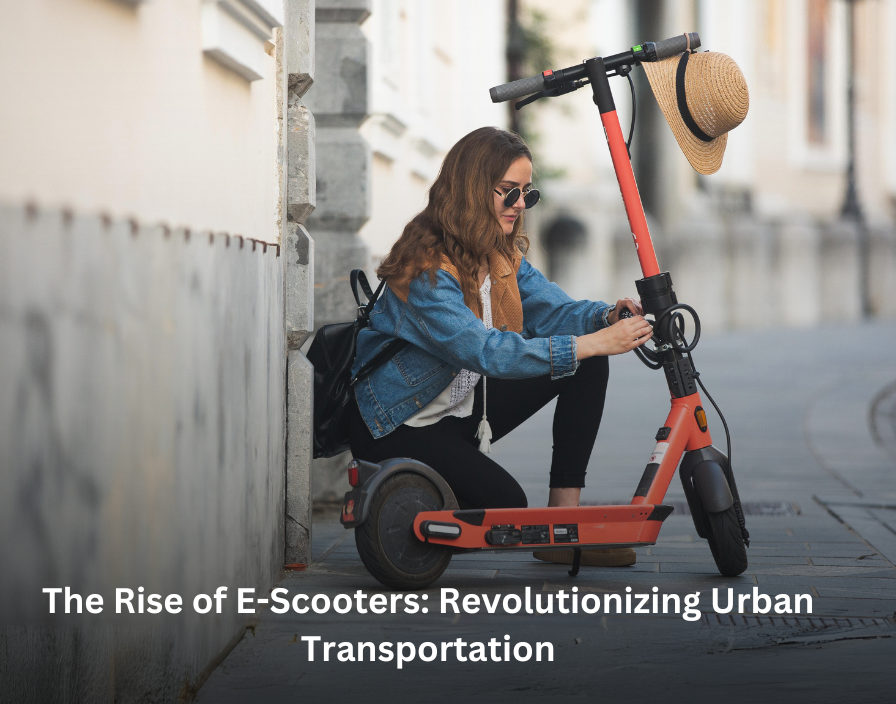The Rise of E-Scooters: Revolutionizing Urban Transportation

In recent years, the urban transportation landscape has undergone a significant transformation with the emergence of electric scooters, commonly known as e-scooters. These compact, eco-friendly vehicles have gained immense popularity as a convenient and efficient mode of transportation in cities worldwide. In this blog, we will delve into the world of e-scooters, exploring their features, benefits, challenges, and the impact they have on urban mobility.
What are E-Scooters?
E-scooters are battery-powered, motorized scooters designed for short-distance travel in urban areas. They typically consist of a lightweight frame, two wheels, a handlebar, and an electric motor. E-scooters are propelled by the rider's feet, assisted by the electric motor, which provides additional speed and acceleration. They are equipped with rechargeable batteries that offer a range of 10 to 30 miles, depending on the model.
Benefits of E-Scooters:
a. Environmentally Friendly:
One of the primary advantages of e-scooters is their environmentally friendly nature. Unlike cars or motorcycles, e-scooters produce zero emissions during operation, reducing air pollution and contributing to a cleaner and greener urban environment.
b. Cost-Effective:
E-scooters are an economical mode of transportation, especially for short commutes. They require significantly less maintenance compared to cars and motorcycles, and the cost of electricity for charging is considerably lower than fuel costs.
c. Reduced Congestion:
The compact size of e-scooters allows riders to navigate through traffic congestion easily. By choosing e-scooters over larger vehicles, riders can contribute to alleviating traffic congestion in busy urban areas.
d. Health and Fitness:
Riding an e-scooter provides a form of exercise as it engages the rider's core muscles and promotes a more active lifestyle.
Challenges and Concerns:
a. Safety:
Safety concerns have been a significant point of discussion regarding e-scooters. The absence of proper infrastructure, such as dedicated lanes or parking spaces, can result in accidents and collisions. It is crucial for riders to wear helmets, follow traffic rules, and be cautious of pedestrians and other vehicles.
b. Regulatory Issues:
The rapid proliferation of e-scooters has presented challenges for local authorities in terms of regulating their use. Many cities have implemented specific rules and regulations to ensure the safe and responsible operation of e-scooters, including speed limits, designated parking areas, and licensing requirements.
c. Sidewalk Usage:
E-scooters are often used on sidewalks, which can pose a challenge for pedestrians, especially those with disabilities or limited mobility. Striking a balance between accommodating e-scooter riders and ensuring pedestrian safety remains a significant concern.
d. Maintenance and Battery Life:
The lifespan of e-scooter batteries can be a limiting factor. Over time, battery performance may degrade, reducing the range and overall efficiency of the scooter. Proper maintenance, including regular battery checks and replacements, is essential to ensure a reliable and long-lasting e-scooter.
Impact on Urban Mobility:
E-scooters have had a transformative impact on urban mobility. They offer a flexible, last-mile solution, bridging the gap between public transportation and final destinations. For commuters, e-scooters provide a convenient alternative to cars for short trips, reducing reliance on fossil fuels and easing traffic congestion. Additionally, the shared e-scooter model has gained popularity, with companies offering app-based rentals, making them easily accessible to a broader population.
Conclusion:
E-scooters have emerged as a game-changer in the urban transportation sector, offering a sustainable, cost-effective, and efficient mode of travel. While they come with their share of challenges, addressing safety concerns, improving infrastructure, and implementing responsible regulations can help harness the full potential of e-scooters. With continued advancements in technology and increased awareness, e-scooters have the potential to revolutionize urban mobility, making cities cleaner, greener, and more accessible for all.





